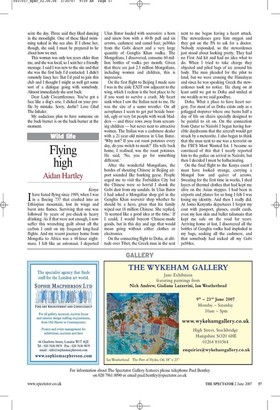Flying high
Aidan Hartley Kenya T have hated flying since 1989, when I was 1 in a Boeing 737 that crashed into an Ethiopian mountain, lost its wings and burst into flames. Surviving that one was followed by years of pre-check-in heavy drinking. As if that were not enough, I now suffer this wrenching guilt about all the carbon I emit on my frequent long-haul flights. And my recent journey home from Mongolia to Africa was a 48-hour nightmare. I felt like an astronaut. I departed Ulan Bator loaded with souvenirs: a horn and sinew bow with a 40-lb pull and six arrows, cashmere and camel hair, pebbles from the Gobi desert and a very large quantity of Genghis Khan vodka. The Mongolians, I discovered, consume 60 million bottles of vodka per month. Given that there are just 2 5 million Mongolians, including women and children, this is impressive.
On the first flight to Beijing I made sure I was in the aisle EXIT row adjacent to the wing, which I reckon is the best place to be if you want to survive a crash. My heart sank when I saw the Italian next to me. He was the size of a sumo wrestler. On all aeroplanes I seem to get put beside boorish, ugly or very fat people with weak bladders — and three rows away from screaming children — but never next to attractive women. The Italian was a cashmere dealer with a 21-year-old mistress in Ulan Bator. 'Why not? If you eat roast potatoes every day, do you switch to mash?' His wife back home, I realised, was the roast potatoes. He said, 'No, you go for something different.'
After the wonderful Mongolians, the hordes of shouting Chinese in Beijing airport sounded like honking geese. People urged me to visit the Forbidden City but the Chinese were so horrid I shook the Gobi dust from my sandals. In Ulan Bator I had asked a Mongolian shop girl in the Genghis Khan souvenir shop whether he should be a hero, given that his family wiped out 18 million Chinese. She replied, 'It seemed like a good idea at the time.' If I could, I would boycott Chinese-made goods, but in this day and age that would mean going without either clothes or electronics.
On the connecting flight to Doha, at altitude over Tibet, the Greek man in the seat next to me began having a heart attack. The stewardesses gave him oxygen and they got on the PA to ask for a doctor. Nobody responded, so the stewardesses just stood about looking pretty. They had no First Aid kit and had no idea what to do. When I tried to take charge they objected and piled bags of ice around his body. The man pleaded for the pilot to land, but we were crossing the Himalayas and since he was speaking Greek the stewardesses took no notice. He clung on at least until we got to Doha and smiled at me weakly as we said goodbye.
Doha. What a place to have heart surgery. For most of us Doha exists only as a jetlagged stopover where one burns half a day of life on chairs specially designed to be painful to sit on. On the connection from Qatar to Nairobi I began having horrible daydreams that the aircraft would get struck by a meteorite. I also began to think that the man next to me was a terrorist on the FBI'S Most Wanted list. I became so convinced of this that I nearly reported him to the police on arrival in Nairobi, but then I decided I must be hallucinating.
On the final flight to the Kenya coast I must have looked strange, carrying a Mongol bow and quiver of arrows. Sweating for the first time in weeks, I shed layers of thermal clothes that had kept me alive on the Asian steppes. I had been in airports and planes for so long I felt I was losing my identity. And then I really did. At Jomo Kenyatta departures I forgot my coat with passport, glasses, credit cards, even my lion skin and bullet talismans that kept me safe on the road for years. Arriving home at last, I discovered all the bottles of Genghis vodka had imploded in my bags, soaking all the cashmere, and that somebody had nicked all my Gobi pebbles.




















































 Previous page
Previous page